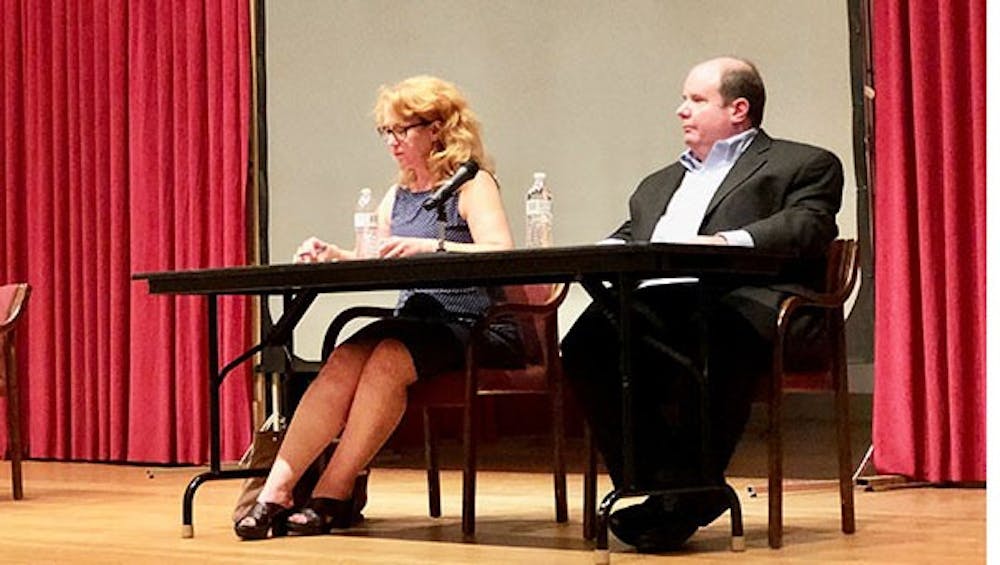The #MeToo movement was the focus of a panel of Shippensburg University professors held Thursday in SU’s Old Main Chapel at the 13th annual Criminal Justice symposium.
The topic of discussion, the #MeToo movement, focused on whether or not it provides justice.
With a panel of experts from the political science, communication/journalism, criminal justice and psychology departments, the evening provided multiple angles and perspectives of the topic.
Stephanie Jirard, professor of criminal justice and moderator for the evening, kicked off the event by explaining what the #MeToo movement is and what it stands for.
The #MeToo movement is a large group of people, according to Jirard, who stand together against sexual harassment and sexual assault. Many involved in the movement are sexual harassment and sexual assault survivors.
Kyle Heim, a professor of communication/journalism began the discussion by focusing on the news media and its role within the #MeToo movement.
Women are not always covered by the news media well, Heim said.
He added the media tends to look at cases such as sexual assault or harassment as individual incidents, rather than asking the big important questions, like “why is this such a large societal problem?”
Heim spoke on the fact of women coming forward to the media through the #MeToo movement.
Though more women are willing to have their stories heard, many are still reluctant to give their identity to the media for fear of victim blaming, Heim said.
He added that since the #MeToo movement began, women’s media coverage has increased by 30%.
The panel continued with SU political science professor, Alison Dagnes, who explained how the understanding of #MeToo is too broad.
According to Dagnes, the movement covers a “wide variety of behavior including rape, sexual harassment and miscommunication.”
She added that one of the issues within politics, is that politicians often have a mindset that people look at them as “scummy.”
Dagnes referred to former president Bill Clinton lying under oath about having a sexual relationship with a woman working for the White House. She noted that until very recently if sexual assault or harassment charges were filed against a member of Congress, all their legal fees were covered by taxpayer dollars.
Claims of sexual assault or sexual harassment were able to end the political bids of 12 Republicans and 13 Democrats in 2018, according to Dagnes.
Panelist Amber Norwood, a member of the SU psychology department, spoke about the #MeToo movement from the psychological perspective, explaining that research proves that sexual abuse is a learned behavior.
This learned behavior can also increase when it goes unreported or has little to no consequence, according to Norwood. Norwood also said that those who commit sexual crimes are “cognitively distant from their victims.”
When a predator is caught in their abusive behavior, “their first thought is self-preservation,” she added.
Norwood explained that a sexual abuse victim can have an incredibly diverse range in trauma response — from sobbing uncontrollably, to laughing and smiling or even having no emotional response whatsoever.
Norwood encouraged the audience to watch the new Netflix series “Unbelievable,” to further understand the wide range of trauma response that can be seen in a sexual abuse victim.
The final speaker of the event was Arelys Madero of the criminal justice department.
Madero showed research which stated “three in four women refrain from reporting sexual abuse.”
According to Madero, credibility to victims has also been hurt in the past few years due to people believing there has been a spike in false allegations of sexual abuse. Yet, Madero reported that FBI statistics show a consistency in the number of clear rape cases.
Only one third of rape cases get cleared and only one percent end up going to a prosecutor. However, research proves only three to ten percent of rape allegations are false according to Madero.
So, has the #MeToo movement brought justice? Madero says yes.
“It has changed our culture a great deal in accounts to bringing down some of the barriers that victims face, when it comes to social stigma, victim blaming and even more awareness,” Madero said.
However, she agrees that more work needs to be done. More rape kits need to be tested and people need to instinctively believe those who report sexual abuse, according to Madero.
Following the event, Jirard emphasized the importance of having these types of open discussions with students.
“It [sexual assault and sexual violence] is one of the most underreported crimes. In order for us to talk about the shame… that people are often shaming the victims and they often feel like they’re to blame and in order to relieve that stigma, we have to bring these things out into the open.”
Jirard also praised SU and the work the community does to keep the conversation active.
“The SU Women’s Center leads the way, the Pride Center… there are so many safe spaces where people can talk about things that have happened to them or have not. I think Shippensburg leads the way,” she said.


The Slate welcomes thoughtful discussion on all of our stories, but please keep comments civil and on-topic. Read our full guidelines here.